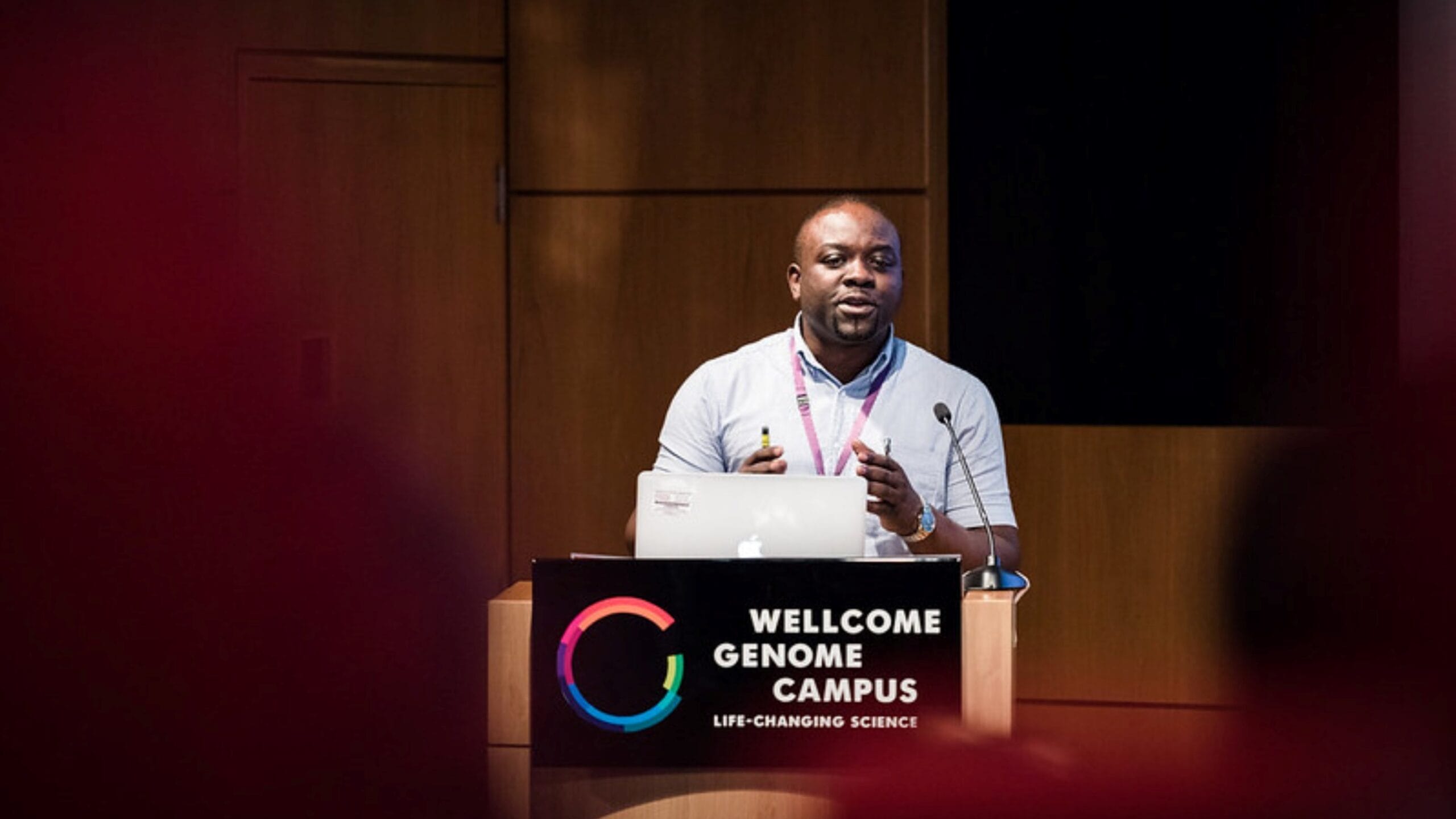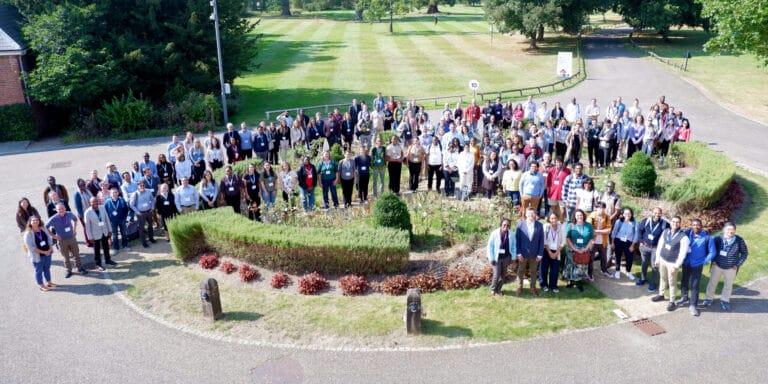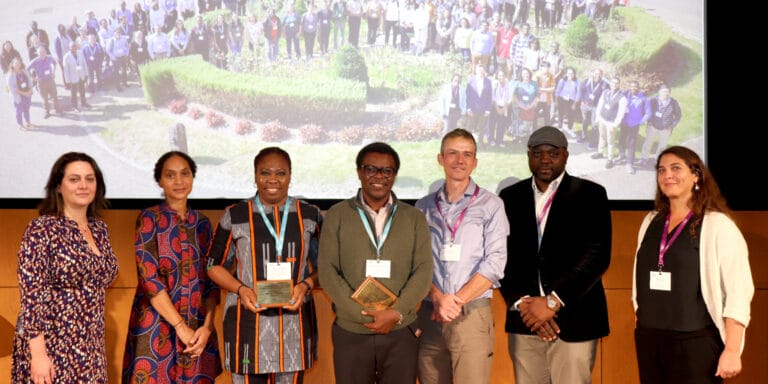Did you always know you wanted to work on malaria?
I wasn’t trained in malaria research during my PhD at the University of Buea; that came slightly later. As a biochemist, my doctoral research was on a parasitic nematode, specifically the blinding filarial worm that causes Onchocerciasis, or “river blindness”. At the time, my focus was on developing vaccines for complex infectious organisms.
Malaria research became a natural extension of my curiosity immediately after my PhD, especially given its impact on endemic populations like those in my home country of Cameroon. It was also slightly opportunistic because malaria research was a secondary research focus in my PhD supervisor’s (Prof Vincent Titanji) lab, where I trained in molecular biology and immuno-epidemiology. This ultimately led me to shift my focus entirely to malaria research after my PhD.
As a young postdoc, I wanted to apply the knowledge I had gained to find better target antigens that could be developed into malaria vaccines. I was inspired by the approach used to develop the candidate multivalent SPf66 vaccine from Colombia, which was the first malaria vaccine to be tested in endemic countries. I needed an environment conducive to full-time research, so I applied to various research institutions intending to continue working in Africa.

How did you find your research home as you transitioned to malaria genomics?
KEMRI-Wellcome Trust in Kilifi, Kenya was my first choice of institution as I was inspired by Professor Kevin Marsh’s work on malaria immunity – but this didn’t work out. However, my interview for KEMRI-WT became the springboard that led me to the MRC Unit The Gambia at LSHTM, where I began my postdoc in 2006. Here, my early work focused on exploring the molecular pathways used by malaria parasites to invade red blood cells, investigating why some people get severely ill while others do not. Still interested in vaccines, I knew I had to understand the mechanisms determining how people respond differently to the pathogen, and the importance of malaria parasite diversity became evident. To tease out this diversity, genetics and genomics offered the perfect solution.
Around the same time, Professor Dominic Kwiatkowski had set up MalariaGEN and wanted to support African scientists interested in generating and analysing malaria genetic data. I jumped at the new opportunity because I was already doing a lot of targeted sequencing of small sections of the malaria parasite genome. Now, there was an opportunity for us to sequence not just one gene, but to look at all the genes in the parasite at once with the coming of next-generation sequencing technology and collaborations with MalariaGEN and the Wellcome Sanger Institute.
I became involved in a parallel opportunity, collaborating with Professor Dyann Wirth’s team at the Harvard School of Public Health to generate malaria parasite genotype data using Affymetrix microarray chips. These chips would have thousands of oligonucleotide probes synthesised onto their surface and were used to probe nucleotide variation in DNA sequences of interest. So in 2008 and 2009, I found myself working on malaria genomics with two great scientists on both sides of the Atlantic.
I spent three months each at Harvard and the Sanger Institute. These experiences transformed me from a pure biologist as I gained skills in bioinformatics and expanded my ability to interrogate data. Since then, my research group has been asking more pathogen genomics questions and expanding in every way – the number of samples collected from the field, the diversity of populations we access the samples from, and the countries we work in.

How did you expand your research horizons to where they are presently?
Over the years, we’ve established several projects in collaboration with MalariaGEN and the Sanger Institute. By focusing on how parasites have evolved to develop drug resistance, evade immunity, and sustain transmission, we were able to lay the groundwork for projects like the Genomic Surveillance of Malaria in West Africa, which integrates genetic data to inform malaria policies and interventions. Using the extensive malaria genomic data collected, the project aims to interpret and transform it into insights to help National Malaria Control Programmes select the most effective interventions.
I also joined the Plasmodium Genomic Diversity Network Africa (PDNA) consortium led by Professor Abdoulaye Djimde. This enabled me to expand my work from The Gambia into other African countries, as PDNA grew from 14 to over 20 countries, and evolved into the Pathogen Genomic Diversity Network Africa, rather than just Plasmodium.
With funding from the African Academy of Science, the Science for Africa Foundation, and support from MalariaGEN and Sanger, I helped form and now lead the Human Hereditary and Health in Africa (H3Africa) Pan-African Malaria Genetic Epidemiology Network (PAMGEN). By investigating genetic diversity in malaria parasites, and human populations across Africa, this initiative allowed us to start moving several layers up – asking why some people are more susceptible to certain parasites. Extending our research to mosquitoes provides a comprehensive view of malaria transmission dynamics.
In a nutshell, it has been a transformation from being inquisitive about vaccine development and how malaria infections vary among people, to understanding how parasites adapt and sustain themselves in the presence of interventions.
What other projects do you have in the pipeline?
Our current focus is on integrated genomic surveillance, combining human, parasite, and mosquito genetic data to track malaria as new drugs and vaccines are rolled out. This holistic approach aims to uncover the evolutionary arms race among parasites, the adaptation process in mosquitoes, and how these impact malaria transmission and the efficacy of interventions.
We are also thinking about creating African reference genomes for malaria parasites and vectors. The current Plasmodium falciparum 3D7 reference genome, to which the Wellcome Sanger Institute has contributed enormously, was derived from an isolate that was initially detected in a patient in Amsterdam who had never been to Africa. While this reference genome has been incredibly useful, I think it is important for us to start generating new references that are representative of more recent and diverse African parasite populations. Part of the way to achieve that is to explore new technologies such as long-read sequencing and nanopore.

As the Genomic Surveillance of Malaria in West Africa project advances, Sanger’s Genomic Surveillance Unit has worked with us and collaborators in West Africa to build capacity to generate targeted sequences through amplicon sequencing. The hope is that we will be able to generate whole genome sequences in the near future by paving the way for advanced analysis.
How do you think malaria genomics should evolve to address emerging challenges?
There are currently two approved malaria vaccines, but parasites have shown their resilience over time. In Africa, the first line of treatment involves artemisinin combination drugs, and there are signs that the parasite is getting tolerant to these. Some parasites have deleted key genes targeted by rapid diagnostic tests, allowing them to remain undetected. Although we know some markers of resistance, we are uncertain how parasites will respond to combined pressures from vaccines and drugs used together. The hope is that these pressures will eliminate the parasite, but we must stay vigilant. This demands studying diverse parasite populations to decipher their survival mechanisms in different malaria-endemic regions. In-depth research is needed to understand how the entire genomic architecture of parasite populations might change to sustain fitness under pressure.
There’s always a risk that some parasites may evade both vaccines and drugs, potentially leading to the spread of “super-parasites”. This frightening scenario, though hypothetical, must be investigated. To stay ahead, we need a better understanding of parasite evolution over time, and this requires substantial resources and continuous surveillance efforts.
When I get the chance to speak to funders, I emphasise that the largest database of publicly available malaria parasite genome sequences, MalariaGEN Pf7, includes 20,000 isolates and is remarkably useful, but it’s only a fraction of what we need. This is a pathogen that infects 250 million people a year. In the past 20 years, we’ve only scratched the surface.
Additionally, we focus predominantly on Plasmodium falciparum, the deadliest malaria parasite, while other species are circulating and becoming more prevalent as we target P. falciparum for elimination. It is crucial to understand how these other species manage to sustain low-level transmission in populations and we may need to develop new interventions against them. Luckily, genomics and molecular parasitology tools are becoming more accessible, and many researchers are exploring these areas at different levels.
What excites you about the future?
Malaria is one disease. With malaria as a model, we are learning how to use genomics for the surveillance and control of many pathogens. Other pathogens may emerge in the future, so the transfer of skills and technologies to our platforms is essential. A significant part of my work involves capacity building and training PhD students and postdocs to continue this critical research. As we look to the future, our goal is to transition from relying on external partners for advanced genomic research. We want to generate and analyse data locally to ensure sustainable research capacity to meet local health challenges and improve lives and livelihoods in Africa.
To see how things have progressed for Alfred and for the field over the last decade, read this short interview with Alfred, which we originally published more than nine years ago, in 2015.



